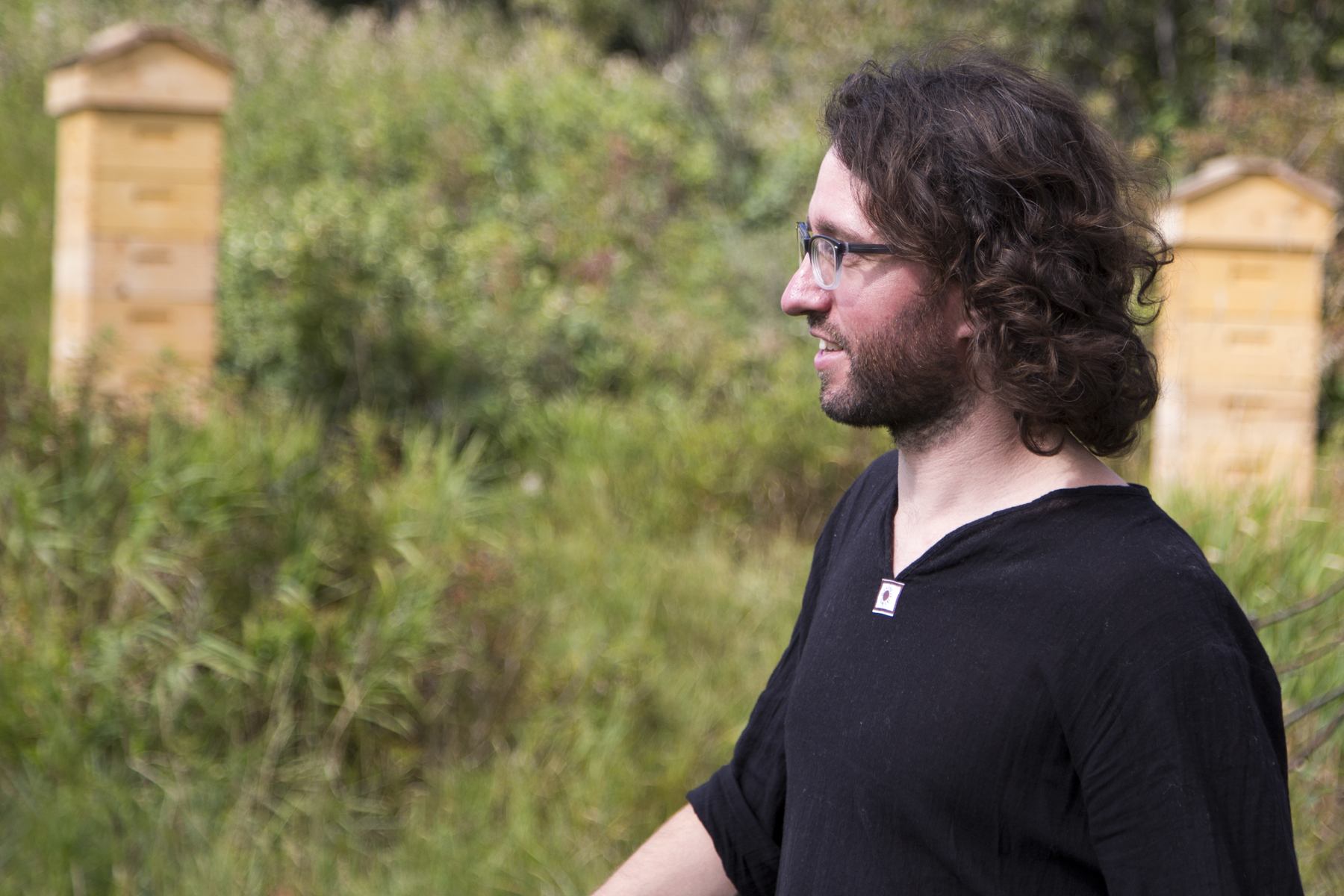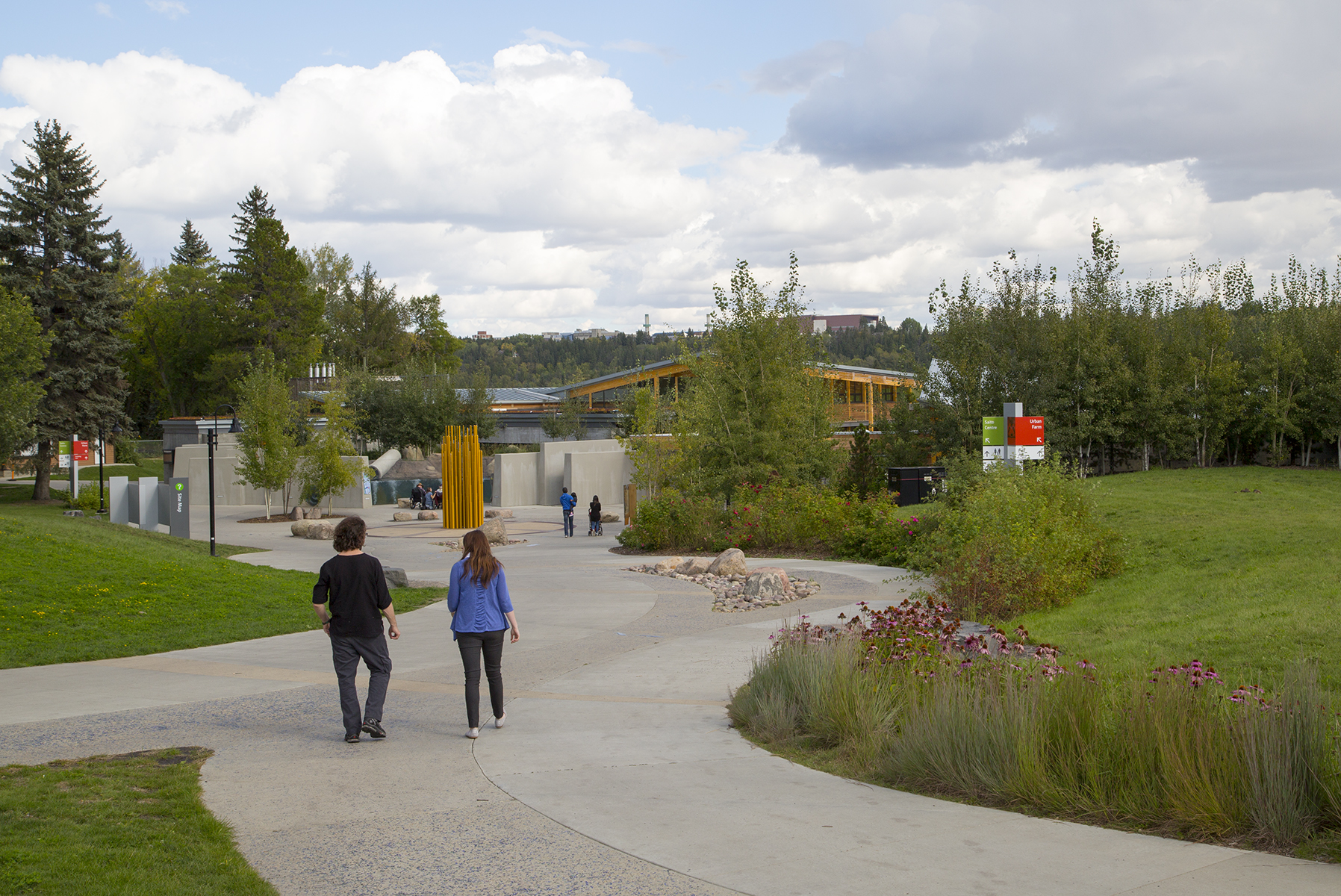
Sustainability scholar Scott Boyce at the Edmonton Valley Zoo beehives. (Photo: Ramona Czakert Franson)
When Scott Boyce heard about the opportunity to create a sustainability plan for the Edmonton Valley Zoo, he jumped at the chance to be a sustainability scholar. Not only would it give him some background for his master's thesis in conservation biology - he plans to measure greenhouse gas emissions across the City Edmonton - but he would learn how create a sustainability plan and make contacts for his career. Boyce recognized the value of the program immediately because he had worked for six years for various organizations after his undergraduate degree before deciding to go back to UAlberta for his master's degree.
The Sustainability Scholars program provides stipends to UAlberta graduate students to complete sustainability-related applied research projects with a mentor. It is sponsored by the City of Edmonton, the University of Alberta's Office of the Provost, Facilities and Operations, the Office of Sustainability, the Faculty of Graduate Studies and Research and a Government of Alberta grant. It is administered by the University of Alberta Career Centre.
Boyce's City of Edmonton mentor, Experiences Program Manager, Jasmine Spraakman, was impressed, "Scott was the perfect candidate. He showed up and totally ran with it. He was really self-driven and fit right in in our busy (summer) time."
For the framework of the sustainability plan, Boyce and Spraakman used the green guide from the Association of Zoos and Aquariums (AZA) which to the list of nine criteria, from energy management to purchasing, Boyce added ecological conservation. He took a holistic approach and in addition to interviewing other zoos about their sustainability plans, he also delved into the operations of the zoo. It was important to have an understanding of how a zoo actually operates to measure its sustainability, so he would be weeding and picking up garbage on one day, and learning about water management with the site supervisor, the next. Boyce enjoyed the work and the comradery so much he has since stayed on as a volunteer zookeeper. But despite Boyce's enthusiasm and abilities, he had a huge challenge.
Time.
This past year, sustainability scholars only had 250 hours with a mentor from either the City of Edmonton or UAlberta from May 2 to Aug. 15, 2016. He could've legitimately spent the entire 250 hours on one section, so budgeting his time effectively was key. But this deadline is part of the design of the program, to immerse students in real world learning.
"Accountability is high," says Naomi Krogman, Academic Director, Office of Sustainability, who started program in 2014, "this is about trying to inform best practices, taking their expertise and putting it to something real." Krogman is pleased with the success of the program, it has grown from just six scholars to 18 in just two years. "I just think it is amazing, all the cooperation from so many people, out of goodwill." She credits Mayor Iveson for helping to get the project off the ground and City of Edmonton Program Manager - Engagement , Heather Wheeliker, for helping to make it better each year.

The projects are developed by the employers, based on their needs and then tweaked to fit into the time frame and sustainability goals before posting. Last year there were also two open university positions in which students submitted their own proposals. One studied if breastfeeding was supported on campus in terms of providing private space, refrigeration, comfortable chairs, places to wash up and the other looked at the university's swag, finding promotional items that were sustainable. Another unique project came from UAlberta's Human Resources Services that studied hiring with equity, diversity and inclusion, in which the student developed a training module for those who hire others. Krogman thinks it is important to think about sustainability beyond land, air, water and energy to health, justice and governance across the social sciences.
She also acknowledges the huge benefit of the program to employers, "These students are really outstanding people; they are really committed and knowledgeable in the areas where the world is going."
As an employer, Spraakman was thrilled that Boyce selected her sustainability plan, she had been trying to create a plan for years but had found her work kept her from it. The chair of the zoo's voluntary employee Green Team group, she was passionate about sustainably but lacked the expertise. She describes her relationship with Boyce as more of a partnership than a mentorship and she highly recommends the program. "It is great to have a sustainability scholar come into your organization and look at it in a different light, especially a grad student with the education."

And Boyce found his experience inspirational and believes the skills he's acquired are very applicable to other businesses; he thinks he's developed a skill-set where he can now create sustainability plans for other similar-sized organizations.
"I think it was great opportunity for me to develop a skillset which will, in the future, become very useful."
And how did the zoo measure up? Its new buildings use environmentally friendly technologies like green roofs and practices like storm water collection and with the help of Boyce's plan, it looks like it will achieve its goal of becoming a model of environmental responsibility for other City facilities.
The Edmonton Valley Zoo is looking at creating projects for one to two sustainability scholars for next year.